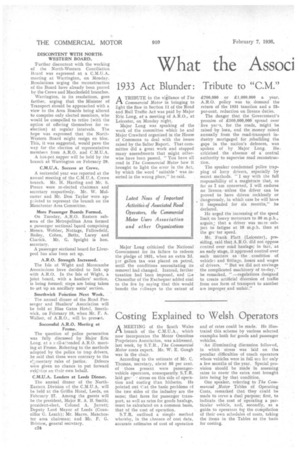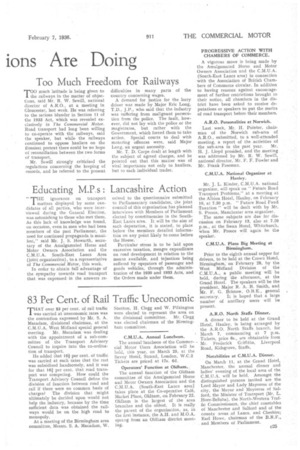What the Associ ions Are Doing
Page 78

Page 79

If you've noticed an error in this article please click here to report it so we can fix it.
1933 Act Blunder: Tribute to "C.M."
ATRIBUTE to the vigilance of The Commercial Motor in bringing to light the flaw in Section 11 of the Road and Rail Traffic Act was paid by Major Eric Long, at' a meeting of A.R.O., at Leicester, on Monday night.
Major Long was speaking of the work of the committee which he and Major Crawfurd organized in the House of Commons to deal with the issues raised by the Salter Report. That committee did a great work and stopped many amendments that might otherwise have been passed. "You have all read in The Commercial Motor how it brought to light the error in the Act, by which the word suitable' was inserted in the wrong place," he said.
Major Long criticized the Nations Government for its failure to redeem the pledge of 1931, when an extra 2d. aer gallon tax was placed on petrol, until the conditions necessitating its removel had changed. Instead, further taxation had been imposed, and alle Chancellor of the Exchequer added coal to the fire by saying that this would benefit the reilways to the extent of
£700,000 or £1,000,000 a year. A.R.O. policy was to demand the return of the 1931 taxation and a 25per-cent. reduction on licence duties. The danger that the Government's promise of £100,000,000 spread over five yee-s, for the roads, might be raised by loan, and the money raised annually from the roadetranspor't industry mortgaged for rebuilding the gaps in the nation's defences, was spoken of by Major Long, He criticized the absence of a central authority to supervise road reconstruction.
The speaker condemned police trapping of lorry drivers, especially by secret methods. " I say with the full responsibility of a magistrate that, ED far as I am concerned, I will endorse no licence unless the driver can be proved to have driven recklessly or dangerously, in which case he will have it suspended for six months," he declared.
He urged the increasing of the speed limit on heavy motorcars to 30 m.p.h., arguina that a driver was mcre subject to fatigue at 10 m.p.h. than at the gre• ter speed.
• Mr. Frank Platt (Leicester), presiding, =aid that A.R.O. did not oppose control over road haulage; in fact; at an early stage, it approved control over such matters as the , condition of vehicle l and fittings, hours and wages of drivers. " But we did not envisage the complicated machinery of to-day," he remarked, ".—regulations designed to create artificial diversion of traffic from one form of transport to another are improper and unfair."




































































































































































